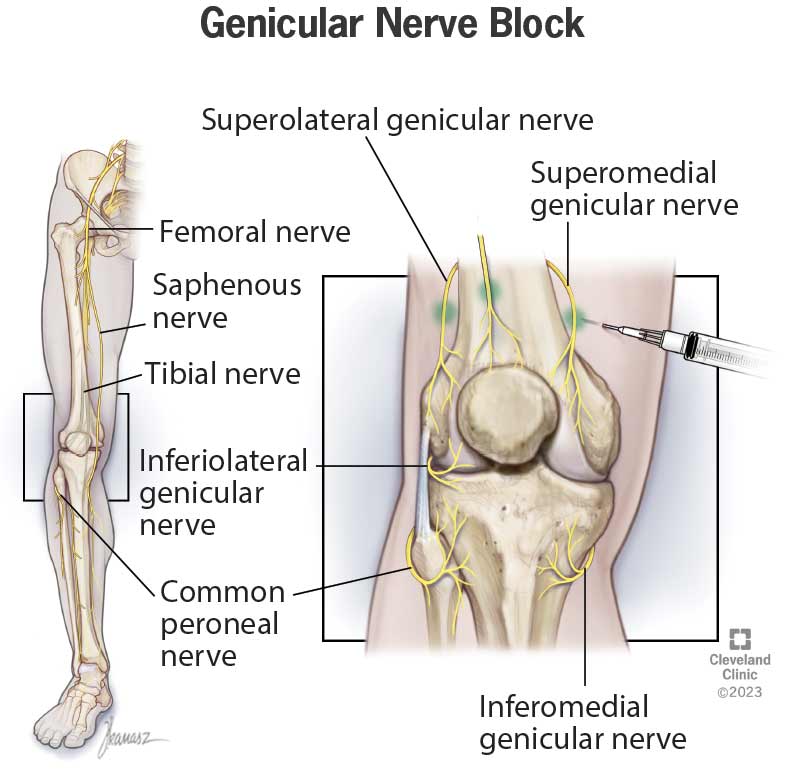A genicular nerve block is an injection in your knee that can provide temporary pain relief. Healthcare providers use them for chronic knee pain and to manage pain after knee surgery. The results can vary from person to person. Some people experience pain relief, while others don’t.
Advertisement
Cleveland Clinic is a non-profit academic medical center. Advertising on our site helps support our mission. We do not endorse non-Cleveland Clinic products or services. Policy

Image content: This image is available to view online.
View image online (https://my.clevelandclinic.org/-/scassets/images/org/health/articles/24823-genicular-nerve-block)
A genicular nerve block is an injection of medication close to certain nerves in your knee to provide temporary pain relief. Some injections provide prolonged pain relief. An injection of steroid medication combined with local anesthetic that may help with pain.
Advertisement
Cleveland Clinic is a non-profit academic medical center. Advertising on our site helps support our mission. We do not endorse non-Cleveland Clinic products or services. Policy
Your knee joints function with the help of several branches of the following nerves:
These branches around your knee joint are known as genicular nerves. “Genicular” means “relating to the knee.” Genicular nerves provide sensory innervation to your knee and include the:
Healthcare providers can safely target all of these nerves for a genicular nerve block except for the ILGN. This is because the ILGN is too close to your peroneal nerve.
A genicular nerve block has two main purposes:
Advertisement
You usually don’t have to do anything special to prepare for a genicular nerve block.
In some cases, your healthcare provider may recommend sedation for the procedure. If you’re receiving sedation, you’ll need to fast for six to eight hours before it. You’ll also need someone else to drive you home after the procedure.
In any case, your healthcare provider will let you know what to do. Be sure to follow their instructions. Don’t hesitate to ask questions.
Healthcare providers typically perform genicular nerve blocks for pain management in an outpatient setting. This means you’re not admitted to a hospital for the procedure and can go home shortly after it.
In general, you can expect the following when you receive a genicular nerve block:
The procedure takes about five to 10 minutes to complete.
After the injection, you’ll rest for 15 to 30 minutes to let the medication take effect. A nurse will also observe you during this time to make sure you don’t have any unexpected side effects. You’ll then be able to go home.
Potential benefits of a genicular nerve block include:
Some people may feel relief in a few hours, or it may take a couple of weeks for the steroid to take effect. It’s important to note that not everyone experiences pain relief from nerve blocks. You may need to try other treatment options if this is the case.
If you experience effective pain relief following a genicular nerve block, your healthcare provider may recommend genicular nerve ablation (GNA) to treat your knee pain. GNAs typically provide pain relief for about 18 months.
You may have some soreness and slight bruising at the site of the injection, but this is usually mild and should go away within a couple of days.
Advertisement
Complications of genicular nerve blocks are rare. But, in general, risks and complications of nerve blocks include:
Yes, you should be able to walk out of the room after the genicular nerve block injection. It’s a good idea to take it easy for the rest of the day, but you can return to your normal activities.
Pain relief from a genicular nerve block can vary significantly. It may last a few days, several weeks, months or even years. But, on average, it lasts about three months. Each person responds differently. Some people don’t experience any pain relief.
Contact your healthcare provider immediately if you experience any new symptoms or complications from the genicular nerve block, such as an infection or nerve issues like burning pain, weakness or tingling.
Genicular nerve blocks can help treat chronic pain in your knee. But the results can vary considerably from person to person. If you’re feeling anxious about receiving a genicular nerve block injection, don’t hesitate to ask your healthcare provider about it and the procedure. They can answer any questions you may have.
Advertisement

Sign up for our Health Essentials emails for expert guidance on nutrition, fitness, sleep, skin care and more.
Learn more about the Health Library and our editorial process.
Cleveland Clinic’s health articles are based on evidence-backed information and review by medical professionals to ensure accuracy, reliability and up-to-date clinical standards.
Cleveland Clinic’s health articles are based on evidence-backed information and review by medical professionals to ensure accuracy, reliability and up-to-date clinical standards.
From sudden injuries to chronic conditions, Cleveland Clinic’s orthopaedic providers can guide you through testing, treatment and beyond.
